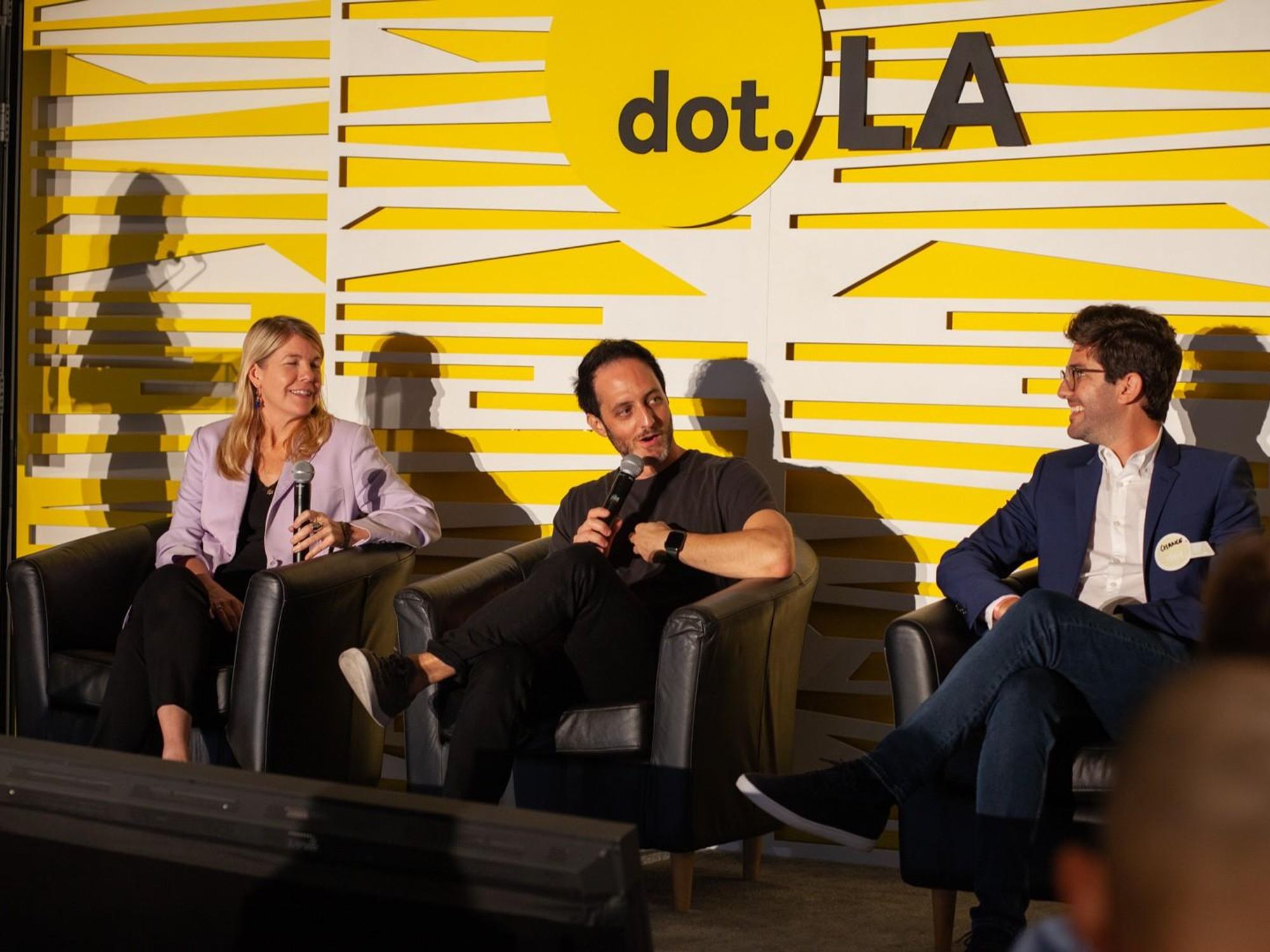Akenta Health Takes First Prize in dot.LA's Pitch Contest
David Shultz reports on clean technology and electric vehicles, among other industries, for dot.LA. His writing has appeared in The Atlantic, Outside, Nautilus and many other publications.

The first night of the 2022 dot.LA summit concluded on Thursday with a pitch contest featuring three carefully selected L.A.-based startups, the founders vied for a prize package from WeWork, Fenwick & West and Evolution.
The pitches—screened in pre-recorded segments between the night’s fireside conversations—were judged by three L.A. business experts: M13 Partner Anna Barber, Fenwick & West Associate Chance Goldberg and Evolution’s Managing Director and Co-founder Matt Auron
The three finalists included Shirin Laor-Raz Salemnia, founder of Whiz Girls Academy, a female-focused tech lifestyle brand that hosts hackathons and sells merchandise designed to inspire interest in STEM education; Marco Paschina, the founder of Akenta Health, a digital platform aimed at making healthcare more accessible for Latinos; and Antony Tran, the founder of Foundry Six, an augmented reality gaming company trying to bridge the gap between digital fantasy and the real world.
The judges grilled each founder on a host of topics: from headwinds in the healthcare industry to business model specifics to whether or not it’s possible to get hardcore fantasy RPG players out of their gaming chair and into the real world.
Salemnia was up first. She explained her vision for a her lifestyle brand serve a function far beyond simply being cool and making money. Whiz Girl’s main focus it to make STEM topics exciting to girls ages 8-13. Through a combination of secret agent-themed hackathons and a line of slick merchandise, Whiz Girls plans to leverage Salemnia’s prior experience at Mattel to make tech attractive to a new generation of girls. The company plans to operate through a sponsorship model and has already inked deals with big names like Adidas and the L.A. Sparks.
“We want to be a household brand,” said Salemnia.
Akenta followed suit, fielding questions about how Akenta planned to navigate an environment as complex as the United States healthcare system and how the company would be different from other telehealth ventures. It’s a lofty goal aimed at serving a real need: If the platform is successful, it could expand healthcare access for one of America’s fastest growing demographics, providing tangible benefits to 63 million Latino Americans. The basic concept is that the digital service would connect Latinos with bilingual doctors and allow patients to take advantage of telehealth appointments, renew prescriptions and view lab work. And because it’s employers that pay to use the platform, the service comes at no cost to the patient.
“The big problem is that Latinos are extremely under served,” said Paschina during his pitch. “We want to help those people that cannot afford to pay those out of pocket costs. If you don’t trust your doctor, you don’t want to get the care.”
Finally it was Tran’s turn to take center stage. Foundry Six is trying to build an augmented reality gaming experience quite unlike anything that’s come before it. Positioned as a fantasy role playing game, many aspects of the game felt familiar: a leveling system, gear and loot and a host of mythical enemies. But all of this is taking place against the backdrop of the real world. A magic shield might be hidden on an actual mountain top; Chuthulu might spawn in a pond down the street. You’ll actually have to leave your house to find quests and rewards. If done right, the game should blur the lines between gameplay and reality.
“That’s the space we want to play. We think that’s going to be a lot more magical,” said Tran.
With pitches pitched, Barber, Goldberg, and Auron then left the stage to deliberate. Unseasonably warm Los Angeles air circulated amidst the crowd gathered atop the Petersen Automotive Museum’s penthouse patio. Hors d'oeuvres sweated on table tops. A drum rolled, metaphorically.
When the judges returned to the stage, Barber announced that it would be Akenta that would take this year’s prize. Paschina returned to the stage to accept his trophy and pose for photos.
Well deserved. Congratulations to all our entrants and good luck.
- dot.la 2022 Summit Highlights: Tech Conferences Abound - dot.LA ›
- Akenta Health Works To Offer More Spanish-Speaking Doctors - dot.LA ›
David Shultz reports on clean technology and electric vehicles, among other industries, for dot.LA. His writing has appeared in The Atlantic, Outside, Nautilus and many other publications.



 Image Source: Revel
Image Source: Revel
